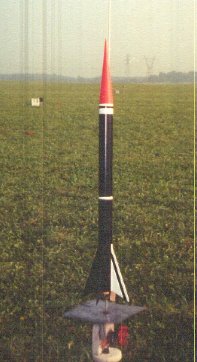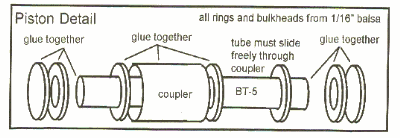| Manufacturer: | Scratch |
(Contributed - by Rachael Phipps, age 10(written by Dad))
 Rachael wanted a new rocket, but wanted something different. She
looked through the Estes catalog and thought the Gemini DC was cool with two
parachutes. Her and I talked about a lot of ideas, and a few days later she
presented me the plans for the Oriole II. I helped with the measuring and
cutting and painting, but Rachael figured out how it would work.
Rachael wanted a new rocket, but wanted something different. She
looked through the Estes catalog and thought the Gemini DC was cool with two
parachutes. Her and I talked about a lot of ideas, and a few days later she
presented me the plans for the Oriole II. I helped with the measuring and
cutting and painting, but Rachael figured out how it would work.
The Oriole looks and flies normally, but at ejection it breaks into 3 pieces and comes back on streamers.
Parts List
Nose assemblyConstruction: (diagrams and fin templates coming soon)
NC-55 (conical Black Brant style)
6 " elastic shock cord
1.5" x 24" streamer
clay noseweight
Upper Stage / Piston assembly
BT-55 – 9"
BT-5 – about 7.5" long (cut to fit)
TC-55 tube coupler
1/16" balsa centering rings (to center BT-5 in BT-55) – you need 5 of these
3/32" balsa bulkhead disks (to fit BT-55) – need 2
8" elastic shock cord
1.5" x 24" streamer
a small amount of scrap balsa
Booster
BT-55 – 9"
Standard motor mount with engine hook
1/8" Launch lugs – need 2 - 1" long and .5" long
18" elastic shock cord
1.5" x 24" streamer
3/32" balsa fin stock
Part 1 – Nose ConePre-flightAdd some clay to the nose cone to make it heavy enough to come down faster, glue the nose cone base on.Tie shock cord to the nose cone and tape a streamer to it.
Part 2 – Booster
Build the motor mount and glue it in.Part 3 – Piston (see the diagram)Cut out the fins, finish as desired.
Mark tube for the fins and glue them on, add fillets.
Glue the short launch lug at the top edge of one fin root, the long lug at the base of the same fin root.
Make an Estes style paper shock cord mount and glue it into place as far down the tube as possible.
(hint: glue in the mount from the engine end of the tube before gluing in the motor mount)
Take two of the centering rings and smear with with thin CA or yellow glue for added strength. When dry, glue one onto the end of the BT-55 coupler and fillet well. Glue the second on and fillet. Sand to fit.Take two more centering rings and the two bulkheads (no hole). Glue one centering ring to a bulkhead with the grain at 90 degree angles. Do the other the same way. These are the ends of the piston.
You may want to add small scrap balsa spacers to the underside of the piston ends to keep it from binding on the glue fillets.
Glue one end of the piston to the BT-5 tube. Insert it through the BT-55 coupler you built above, and make sure it slides easily.
When it fits right, remove the BT-5 and glue the coupler into the upper tube (the one without the motor mount). Glue the last centering ring into the upper tube about 2.5" back from the nose cone (leave room for the nose cone shoulder). Let dry.
Insert the BT-5 through the centering rings, then glue the other end of the piston on. See the diagram.
Make another of the paper type of shock cord mounts and glue it onto the face of the piston nearest the coupler (opposite the nose cone end). Attach a streamer.
Insert engine and igniter first and stand it on its fins. Add wadding, then load in the booster shock cord and streamer. Now load the shock cord and streamer from the piston section and fit the piston section on. Push down with your finger at the nose end to make sure the piston goes all the way down. Now fold the streamer and shock cord from the nose into the top end and place the nose cone in place.
You want the piston to move forward before the ejection charge separates the body tubes, so make sure that everything comes apart easily, especially the nose. Even if the nose doesn't separate at ejection, the clay in it will usually cause separation on the way down. Be careful though, that cone is pointy!!!
Flight Tests
The Oriole II has been flown many times. An A8-3 motor is
really too small and a C motor was way too much. A lot of the fun for this
rocket is seeing it when it comes apart. We use B4-2 motors in it now
and it works just right. Rachael did fly the Oriole II at NARAM.
![[Rocket Pic]](/images/archive/images_descon/oriole2b.jpg)
Sponsored Ads
 |
 |












